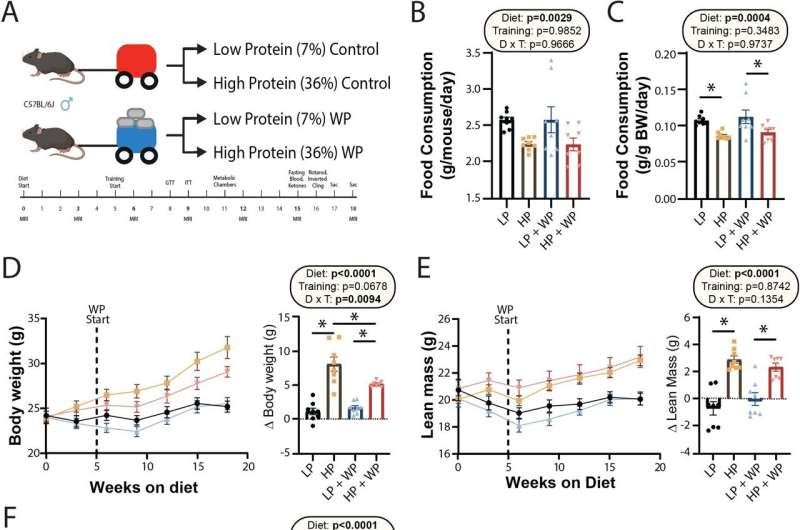This article has been reviewed according to Science X's editorial process and policies. Editors have highlighted the following attributes while ensuring the content's credibility:
fact-checked
peer-reviewed publication
trusted source
proofread
Strength training may reduce health risks of a high-protein diet

Progressive strength training using resistance can protect against the detrimental effects of a high-protein diet, according to new research in mice.
The study, published today as a Reviewed Preprint in eLife, presents what the editors describe as a valuable finding on the relationship between a high-protein diet and resistance exercise on fat accumulation and glucose homeostasis, supported by solid evidence. They say the findings will be relevant to dietitians and others trying to understand links between dietary protein, diabetes and exercise.
Dietary protein provides essential nutrients that control a wide variety of processes in the body and can influence health and lifespan. Protein consumption is generally thought of as good, promoting muscle growth and strength, especially when combined with exercise. Yet in people with a sedentary lifestyle, too much protein can increase the risk of heart disease, diabetes and death.
"We know that low-protein diets and diets with reduced levels of specific amino acids promote healthspan and lifespan in animals, and that the short-term restriction of protein improves the health of metabolically unhealthy, adult humans," explains lead author Michaela Trautman, Research Assistant at the Department of Medicine, School of Medicine and Public Health, University of Wisconsin.
"But this presents a paradox—if high dietary protein is so harmful, many people with high-protein diets or protein supplements would be overweight and at an increased risk of diabetes, whereas athletes with high-protein diets are among the most metabolically healthy."
To examine the possibility that exercise can protect against the detrimental effects of a high-protein diet, the researchers used a progressive resistance-based strength training program in mice. The animals pulled a cart carrying an increasing load of weight down a track three times per week for a three-month period, or pulled an identical cart without any load for the same time period.
One group of mice were fed a low-protein diet (7% of calories from protein) and a second group were fed a high-protein diet (36% of calories from protein). The team then compared the body composition, weight and metabolic measurements, such as blood glucose, of the different groups.
The results were as the team expected: the high-protein diet impaired metabolic health in sedentary mice pulling no weight; these mice gained excess fat mass compared to the low-protein diet mice. But in the mice pulling the increasing weight, a high-protein diet led to muscle growth especially in the forearm, and protected the animals from gaining fat. However, the exercise did not protect the mice from the effects of high protein on blood sugar control.
Additionally, although the high-protein-fed mice gained strength more quickly than the low-protein-fed mice, there was no difference in the maximum weight each set of mice could pull by the end of the study period, even though the mice fed high-protein diets were bigger and had larger muscles.
Although the evidence supporting the claims of the study was considered to be solid, the editors highlight a couple of limitations. For instance, the use of mice might limit the generalizability of the findings to humans, due to inherent physiological differences. The editors note that the findings would also be strengthened further by the inclusion of a direct investigation into the underlying molecular mechanisms responsible for the observed results.
"We know that many people deliberately consuming high-protein diets or consuming protein supplements to support their exercise regimen are not metabolically unhealthy, despite the body of evidence showing that high-protein levels can have detrimental metabolic effects," says senior author Dudley Lamming, Associate Professor of Medicine (Endocrinology) at the Department of Medicine, School of Medicine and Public Health, University of Wisconsin.
"Our research may explain this conundrum, by showing that resistance exercise protects from high-protein-induced fat gain in mice. This suggests that metabolically unhealthy, sedentary individuals with a high-protein diet or protein supplements might benefit from either reducing their protein intake or more resistance exercise."
More information: Michaela E. Trautman et al, Resistance exercise protects mice from protein-induced fat accretion, eLife (2023). DOI: 10.7554/eLife.91007.1




















